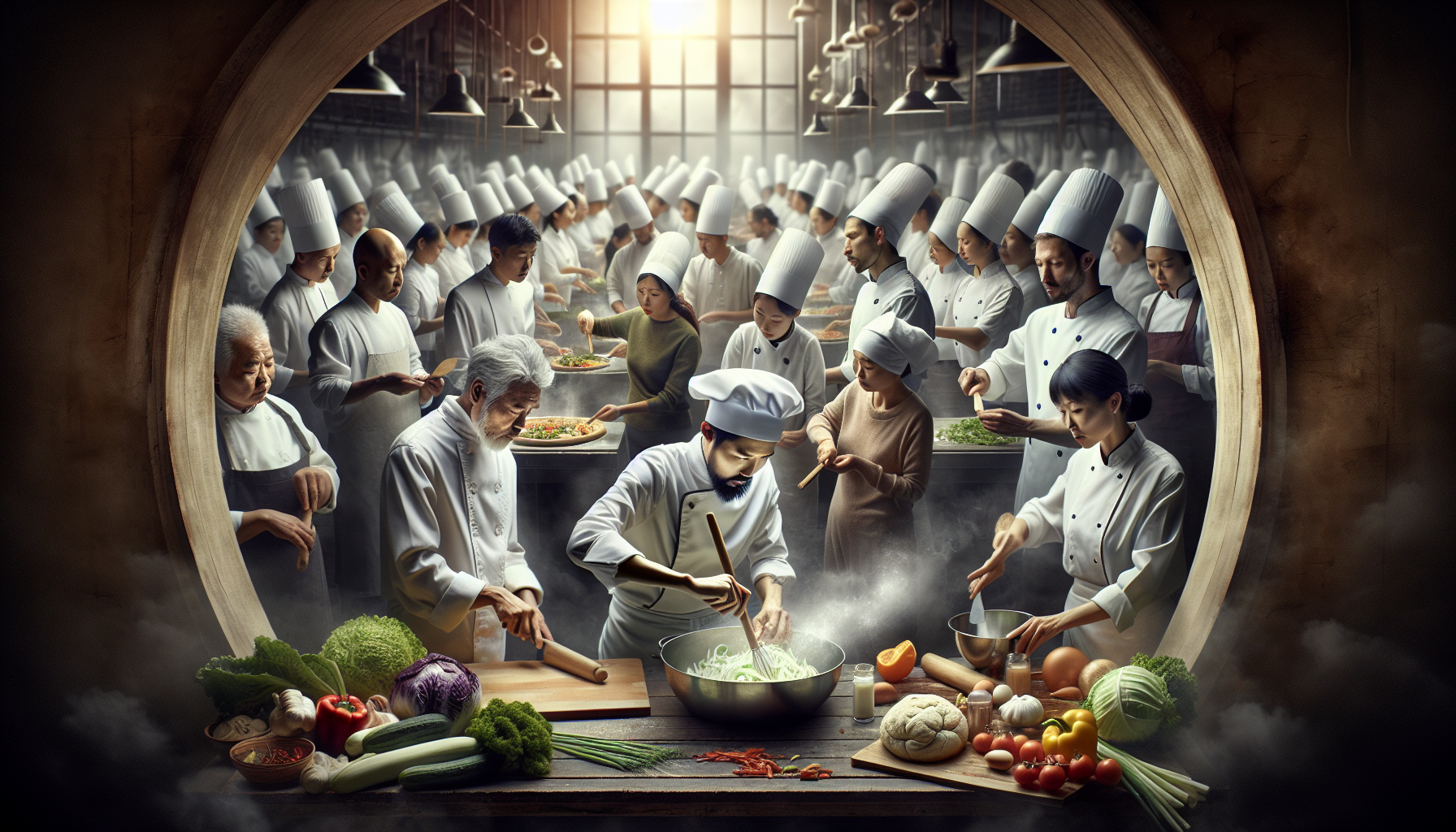Introduction: The importance of effective training in mastering kitchen skills
Why effective training is crucial for mastering kitchen skills
Mastering kitchen skills is essential for anyone aspiring to become a successful chef. Whether you dream of working in a Michelin-starred restaurant or simply want to impress your friends and family with delicious meals at home, honing your culinary abilities is a must. And the key to achieving mastery lies in effective training.
When it comes to learning complex techniques and developing a strong foundation in the culinary arts, proper training is vital. It not only equips you with the necessary knowledge and techniques but also instills discipline, precision, and problem-solving skills that are essential in a fast-paced kitchen environment.
The benefits of effective training in the culinary world
1. Skill Development: Effective training helps you build a solid skill set, from basic knife handling and cooking techniques to advanced culinary methods. By learning from experienced professionals, you can acquire the expertise needed to create exceptional dishes and execute them flawlessly.
2. Efficiency: Training in a professional kitchen environment helps you understand the importance of efficiency and time management. You’ll learn how to organize your workspace, prioritize tasks, and work effectively under pressure, ultimately improving your productivity.
3. Creativity: The best chefs are known for their creativity and ability to think outside the box. Effective training exposes you to a variety of ingredients, flavors, and cooking styles, encouraging you to experiment and develop your own unique culinary style.
4. Networking Opportunities: Training under experienced chefs introduces you to a network of professionals in the culinary industry. This network can provide invaluable connections and opportunities for collaboration, career advancement, and even mentorship.
Conclusion: Investing in effective training for culinary success
When it comes to mastering kitchen skills, effective training is the key to success. It provides the foundation, knowledge, and confidence needed to excel in the culinary world. Whether you choose to pursue a culinary career or simply want to enhance your cooking abilities, investing in proper training is a wise decision.
Remember, learning is a continuous process, and even the most experienced chefs are always seeking to expand their knowledge and refine their techniques. So, embrace the importance of effective training and embark on a culinary journey that will open up a world of possibilities.
Understanding the fundamentals: Building a solid foundation

Building a solid foundation is essential in any endeavor, whether it’s constructing a building, learning a new skill, or pursuing a successful career. The same principle applies to web development. To become a proficient web developer, it is crucial to understand the fundamentals and lay a strong groundwork. In this article, we will explore the key elements of building a solid foundation in web development.
1. HTML: The Backbone of the Web
HTML (Hypertext Markup Language) serves as the backbone of the web. It is the standard markup language used to structure and organize the content on a webpage. Understanding HTML is vital for every web developer, as it provides the basic structure for creating webpages. Mastering HTML allows you to create semantic markup, optimize accessibility, and ensure proper SEO implementation.
2. CSS: Adding Style and Design
CSS (Cascading Style Sheets) is the language used to add style, design, and layout to webpages. It works hand-in-hand with HTML to enhance the visual appeal of a website. Learning CSS enables you to control colors, fonts, layouts, and animations, making a website visually attractive and engaging. A good understanding of CSS is fundamental for creating responsive and user-friendly web design.
3. JavaScript: Enhancing Interactivity
JavaScript is a dynamic programming language that allows web developers to add interactivity and functionality to webpages. It enables you to create dynamic content, handle user interactions, and build web applications. By learning JavaScript, you can bring your webpages to life and provide a personalized and interactive user experience.
4. Responsive Design: Catering to All Devices
In today’s digital age, it is essential to create websites that are accessible and usable across different devices and screen sizes. Responsive design ensures that your webpages adapt and look great on desktops, tablets, and mobile devices. Understanding the principles of responsive design and utilizing CSS media queries will help you build websites that are fully responsive and user-friendly.
5. Version Control: Collaboration Made Easy
Version control is a vital skill for web developers, as it allows multiple developers to work together on a project and keep track of changes. Git, a widely used version control system, enables you to manage and organize your code efficiently. Learning Git will empower you to collaborate effectively, track changes, and easily revert to previous versions if needed.
Building a solid foundation in web development is crucial for success in this fast-paced and ever-evolving field. By understanding the fundamentals, such as HTML, CSS, JavaScript, responsive design, and version control, you lay the groundwork for becoming a proficient web developer. Remember, a strong foundation will not only enable you to create beautiful and functional websites but also provide a solid base for continuous learning and growth in the world of web development. So, start learning and building your solid foundation today!
Enhancing technique: Practicing and perfecting specific skills

Mastering any skill requires dedication, persistence, and a commitment to continuous improvement. When it comes to enhancing technique, it’s crucial to focus on practicing and perfecting specific skills. Whether you’re an aspiring chef, a musician, an athlete, or an artist, honing your craft involves targeted practice and a deep understanding of the foundational techniques. In this article, we will explore effective strategies to improve and refine your skills in any field.
1. Identify the Fundamentals
Before you can pursue advanced techniques, it is essential to identify and grasp the fundamentals. These basics serve as the building blocks upon which you can develop your expertise. Take the time to understand the core principles, techniques, and theories that form the foundation of your craft.
For example, if you are learning to play the guitar, mastering chords and scales is crucial. If you’re a chef, learning knife skills and basic cooking methods is imperative. By solidifying your understanding of the fundamentals, you provide yourself with a strong base from which to build upon.
2. Break it Down
When working to enhance a specific skill, it is often helpful to break it down into smaller, more manageable components. Identify the key elements that make up the skill and practice them individually. By breaking down the skill, you can focus on specific areas that may need improvement.
For example, if you’re a dancer working on your pirouettes, you can break the movement into its different components, such as spotting, balance, and maintaining alignment. By practicing each of these elements separately, you can then bring them together to execute the skill more effectively.
3. Consistent and Structured Practice
Consistency is key when it comes to enhancing technique. Set aside dedicated time each day to practice your skills. Create a structured practice routine that focuses on different aspects of the skill. By incorporating both deliberate and focused practice, you can maximize your progress.
Additionally, consider incorporating different practice techniques, such as repetition, visualization, and feedback. Each of these methods can help reinforce muscle memory, improve technique, and enhance performance.
4. Seek Feedback and Guidance
One of the most effective ways to enhance your technique is to seek feedback from mentors, coaches, or experts in your field. They can provide valuable insight, identify areas for improvement, and offer guidance on how to refine your skills.
Make use of their expertise by asking specific questions, seeking constructive criticism, and actively implementing their advice. Embrace feedback as a tool for growth, and view it as an opportunity to elevate your technique to the next level.
5. Embrace a Growth Mindset
Finally, it is essential to cultivate a growth mindset when working on enhancing your technique. Understand that mastery takes time and effort. Embrace challenges as opportunities to learn and grow, and view setbacks as valuable lessons that contribute to your improvement.
Stay motivated, persevere through obstacles, and maintain a positive attitude. Remember that the journey of enhancing technique is as important as the destination. Enjoy the process, celebrate milestones, and continue to push yourself to reach new levels of excellence.
By following these strategies and incorporating them into your practice routine, you will be well on your way to enhancing your technique and perfecting your skills. Remember, it’s the combination of focused practice, a solid foundation, consistent effort, feedback, and a growth mindset that will ultimately lead you to mastery.
Beyond the basics: Exploring advanced techniques and creativity

Unleash Your Inner Chef with Advanced Techniques
So you’ve mastered the basics of cooking, but now you’re craving something more challenging and exciting. It’s time to take your culinary skills to the next level by exploring advanced techniques that will impress your friends and family.
One advanced technique that every aspiring chef should know is sous vide cooking. This French culinary method involves vacuum-sealing food in a plastic bag and cooking it in a water bath at a precise and consistent temperature. The result? Tender, juicy, and perfectly cooked meals every time.
Another technique that will elevate your dishes is molecular gastronomy. This cutting-edge approach to cooking involves using scientific principles and techniques to create unique and visually stunning dishes. Think foams, gels, and emulsions that will wow your guests.
Embrace Creativity in the Kitchen
Now that you’ve mastered advanced techniques, it’s time to tap into your creative side and let your imagination run wild in the kitchen. Don’t be afraid to experiment with flavors, textures, and presentations to create dishes that are not only delicious but also visually appealing.
One way to unleash your creativity is by incorporating unexpected flavors into your dishes. How about a chocolate and chili-infused sauce for your steak? Or a lavender-infused cocktail to accompany your dessert? Let your taste buds guide you and don’t be afraid to think outside the box.
Presentation is another aspect of cooking where you can let your creativity shine. Pay attention to the arrangement of your dishes, the use of colorful garnishes, and the overall visual appeal. Remember, we eat with our eyes first, so make sure your dishes are a feast for both the palate and the eyes.
Expand Your Culinary Horizons
Exploring advanced techniques and embracing creativity in the kitchen will not only make you a better chef but also broaden your culinary horizons. Don’t shy away from trying new ingredients, cuisines, and cooking methods.
Travel the world through your taste buds and experiment with spices, herbs, and cooking techniques from different cultures. Whether it’s mastering the art of sushi-making or learning the secrets of authentic Indian curry, there’s always something new and exciting to discover in the culinary world.
Remember, cooking is not just about nourishment, it’s an art form that allows you to express yourself and bring joy to others through food. So go beyond the basics, explore advanced techniques, unleash your creativity, and let your passion for cooking shine.
